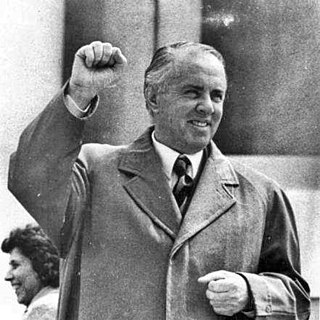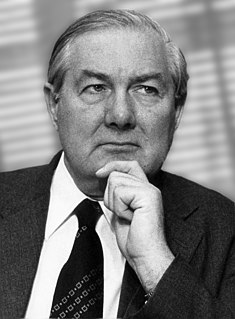A Quote by Kenneth Arrow
The switch to the market in Eastern Europe, of course, has not exactly been one of the greatest advertisements for the market. There's no question the socialist system - and I hate to use the word 'socialist,' but I suppose some description of a system in which the state is in control - was breaking down, really collapsing. In these countries, most markedly in Russia itself and in a number of the others, it obviously was based on a tyranny, which is unacceptable even if it were producing good economic results, which it was not.
Quote Topics
Advertisements
Based
Been
Breaking
Breaking Down
Collapsing
Control
Countries
Course
Description
Down
Eastern
Eastern Europe
Economic
Europe
Even
Exactly
Good
Greatest
Hate
I Hate
Itself
Market
Most
No Question
Number
Obviously
Others
Producing
Question
Really
Results
Russia
Socialist
Some
State
Suppose
Switch
System
Tyranny
Unacceptable
Use
Were
Which
Word
Related Quotes
Capitalism has been fully restored in Yugoslavia, as is well-known, but this capitalism knows how to disguise. Yugoslavia portrays itself as a socialist state, but of a special kind, as the world has never seen it before! The Titoites even boast that their state has nothing in common with the first socialist state which emerged from the socialist October Revolution and which was founded by Lenin and Stalin on the basis of the scientific theory of Marx and Engels.
So many of the new nations which were established as democracies after the second world war, during the decolonizing process, have now changed their system to state-socialism. Small elites run them, and they aren't sharing societies. They aren't even socialist. The power of the state has been merged with business property and you have the greatest concentration of power that's possible.
All systems are capitalist. It's just a matter of who owns and controls the capital -- ancient king, dictator, or private individual. We should properly be looking at the contrast between a free market system where individuals have the right to live like kings if they have the ability to earn that right and government control of the market system such as we find today in socialist nations.
Some people say Russia is running at 50 percent of its gross domestic product under that during the Communist period. In fact, none of the countries seems to have recovered the level that they had under communism, although the other countries in Eastern Europe are doing better than Russia and particularly the Czech Republic seems to be doing modestly well. East Germany I can't count because they have a rich uncle. You have economic benefits which have nothing to do with the workings of the system.
Some people continue to defend trickle-down theories which assume that economic growth, encouraged by a free market, will inevitably succeed in bringing about greater justice and inclusiveness in the world. This opinion, which has never been confirmed by the facts, expresses a crude and naive trust in the goodness of those wielding economic power and in the sacralized workings of the prevailing economic system.
It is not to save capitalism that we fight in Russia … It is for a revolution of our own. … If Europe were to become once more the Europe of bankers, of fat corrupt bourgeoisies we should prefer Communism to win and destroy everything. We would rather have it all blow up than see this rottenness resplendent. Europe fights in Russia because it [i.e., Fascist Europe] is Socialist. what interests us most in the war is the revolution to follow The war cannot end without the triumph of Socialist revolution.
From the time I first understood economic principles, I was always concerned also that any system be operated on an efficient basis, which meant decentralization because knowledge is not concentrated anywhere. It's based on motivation, and so these are the advantages of, say, the cautious case for capitalism, that the market system is efficient.
The society which we have built can in no way be termed "state socialism."The social organization which we have created can be termed a Soviet, socialist organization which has not yet been quite completed, but is in its root a socialist organization of society. The foundation of this society is public ownership.
We believe that the developing crisis in the capitalist system, by which we mean both economic stagnation, and the social and political conflicts to which it gives rise, makes it possible to think in terms of developing a sizeable and serious revolutionary socialist party in a way that was not possible 20 or even 10 years ago.
A famous, very often quoted phrase says: "That government is best, which governs least." I do not believe this to be a correct description of of the functions of a good government. Government ought to do all the things for which it is needed and for which it is established. Government ought to protect the individuals within the country against the violent and fraudulent attacks of gangsters, and it should defend the country against foreign enemies. These are the functions of government within a free system, within the system of the market economy.
In addition to its use in arithmetic and science, the Hindu-Arabic number system is the only genuinely universal language on Earth, apart perhaps for the Windows operating system, which has achieved the near universal adoption of a conceptually and technologically poor product by the sheer force of market dominance.
































